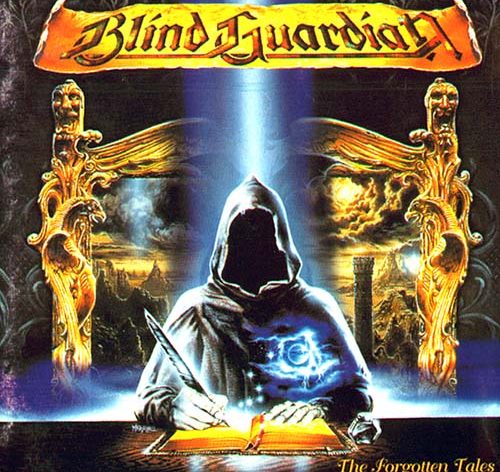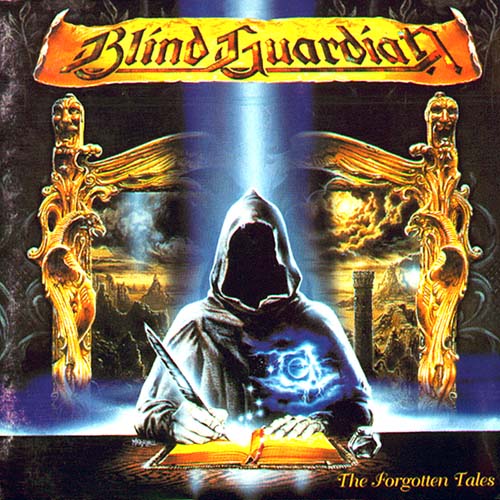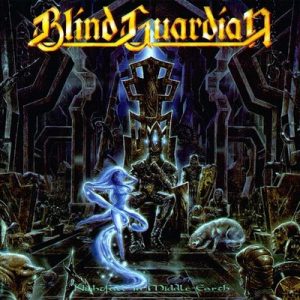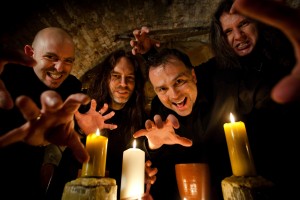Soundtracking Dorkdom: Blind Guardian
I’m going to let you in on a little secret – the Venn diagram of “irredeemable nerd” and “reprobate metalhead” has a pretty big intersection. For every antisocial hesher with a Slayer back patch screwing around in shop class, there’s a stringy-haired mythology enthusiast with a 26-song Iron Maiden playlist to go with his Warhammer 40k army. (Actually, they usually just look like the same person). It makes sense; heavy metal is a genre of music that has historically prided itself on iconoclasm, and generally thrived that way apart from some weird glittery detours in the 80s. And if you want to talk iconoclastic, who moreso than the kids spending lunch break with binders full of Magic cards?
My analogies might be trapped in high school, but hopefully our readers aren’t, and as Grown-Ass Adults we can divorce entertainment from its trappings and social constructs. You don’t have to hide your d20s for fear of swirlies, and you don’t need to listen to a band because the cool (or at least violent and scary) kids are doing it. Instead, you should listen to a band because they’re frickin’ awesome. My mission is to convince you that a band, and in the future perhaps a number of bands, are frickin’ awesome.
Today, said band is Germany’s Blind Guardian, a long-running stalwart of the power metal genre. Without getting too fiddly into it, power metal is an anthemic, harmony-driven form of heavy metal, rife with bombastic choruses and layered vocals, more likely to call to mind riding a flying griffon than tear-assing down the freeway in a muscle car. And over the decades, no band has personified unapologetic bombast better than Blind Guardian. Their name comes from a song on their debut album inspired by Stephen King’s It, and their lyrics have name-checked everything from the Iliad to the struggles of Charles Darwin. It’s not just the lyrics, of course; while they’ve evolved through a few different stages as a band (detailed later), their music has always erred on the side of “unafraid to be ridiculous,” driven by the multi-layered vocals of talented frontman Hansi Kursch. And yet they manage to stop short of the over-the-top synthesized symphonies sputtered out by lesser bands, referred to by scornful headbangers as “flower metal.”
Epic Loot: the album with the most immediate appeal to the nerdly crew is also, conveniently, regarded as Blind Guardian’s magnum opus. 1998’s Nightfall In Middle Earth is a 65-minute trip through nothing less than Professor Tolkien’s Silmarillion, complete with an opening dialogue between Morgoth and Sauron. It approaches the narrative in the abstract, of course, which is good; the Silm is already pretty incoherent without trying to fit it in between guitar solos, but if you listen along you can follow the tragedies of the Numenorians and the House of Finwë. And what a listen it is; Nightfall captures Blind Guardian at the peak of their symphonic phase, using backing piano, woodwinds, and a dose of tasteful synthesizer to add depth and color to their music. There’s a good range of moving ballads, mid-tempo anthems, and speedy bruisers, and the regular interludes are carefully deployed.
Nightfall is absolutely a concept album, best listened to as a single piece, but beyond the story there’s not really unifying musical themes; instead, it succeeds because each of the songs is individually kick-ass. It’s hard to beat album opener “Into the Storm,” which is as good an example of the overall Blind Guardian sound as any song; a slightly off-beat guitar riff structure, that wailing lead guitar tone (guitarist Andre Olbrich has probably one of the most recognizable sounds in heavy metal), and the Big Loud Chorus to end them all. There are a number of other great cuts on Nightfall (the brain-bruising battle-theme “Time Stands Still” and elegaic “Thorn” stand out), but with that opening track, you know exactly what you’re getting into.
Other Riches: right before Nightfall, Blind Guardian made their first major foray into symphonic metal with Imaginations From the Other Side, an album that owes somewhat more to their speed metal roots. The fusion of styles succeeds most on “The Script for My Requiem,” a Crusader anthem rife with breakneck pace changes and featuring possibly the best vocal performance of Hansi’s career (about three minutes in, shit gets real.). On the slightly softer side, there’s two excellent King Arthur songs, the orchestra-heavy and surprisingly gentle “Past And Future Secret” and the stellar murder ballad “Mordred’s Song.” Imaginations is clearly the product of a band still looking for the right sound (and sometimes they just say “fuck it” and go straight ahead speed metal), but it’s a strong, strong effort.
Preceding Imaginations and kicking off a three-album streak of greatness was Somewhere Far Beyond, which is definitely a straight-up speed metal album (as in, the Almighty Riff is king and everything else can get in line.) Probably the best-known song on the album is a little acoustic ditty called “The Bard’s Song (In the Forest),” so beloved by fans that occasionally Hansi will drop the mic at concerts and let the crowd sing the whole thing. But the core of the album is heavy grinders like “Time What Is Time” (a Blade Runner shout-out) and the title track, another Stephen King-inspired song about the Dark Tower series, fortunately written in 1994 before things got weird. If you’re not into traditional metal, this album will take a little more getting used to.
Hidden Treasures: Blind Guardian’s symphonic era reached its inevitable conclusion with the messy A Night At the Opera, in which the guitar-driven core of the songs struggles with layers and layers of synths, orchestral backing, and literally dozens of vocal tracks. And yet there’s a charm to the album; what makes BG a great, appealing band is their sheer ambition, their willingness to embrace the absurd and attempt the ridiculous. Nowhere is that more apparent than album closer “And Then There Was Silence,” a fourteen-minute chronicle of the Trojan War. More than anything else on the album, it displays the heights to which a band willing to just throw in any cool idea they can think of can rise.
Comparatively, back in the 80s and early 90s Blind Guardian was a standard European speed metal band, of the generation that listened to Iron Maiden and responded “Yeah, like that, but moreso.” Of their early albums, the best is probably Follow the Blind, a punchy slab of near-thrash riffs and double-kick drumming marked by the powerful choruses that were already becoming their hallmark. If this is up your alley already, you probably don’t need this article, but those interested in throwing the horns and going old-school should start with “Valhalla” from this album.
After Night At the Opera, the band calmed down a bit and has since put out a pair of albums that are more of a natural evolution of their Imaginations sound; essentially straight-ahead power metal with a dab of orchestration here and there, and a heavy emphasis on the lead-guitar harmonies codified by Nightfall. Their most recent effort, At the Edge of Time, rides this style for over an hour in only ten tracks, with two clocking in over eight minutes. One of them, fittingly, is called “Wheel of Time” and the subject matter is just that; preceding it are two different Song of Ice and Fire-inspired pieces, the balladic overview “War of the Thrones” and up-tempo ripper “A Voice In the Dark” (about Bran Stark, if you must know).
Edge isn’t a particularly ambitious effort by Blind Guardian’s standards, but if they were going to settle on a sound, this is a good one, and bodes well for the future. As long as fantasy authors keep writing books, Blind Guardian will keep reading them on tour and turning them into songs. And I will keep listening to them.









As someone who has just recently been looking for some more accessible metal to try out, I’m definitely taking the recommendations! 😀